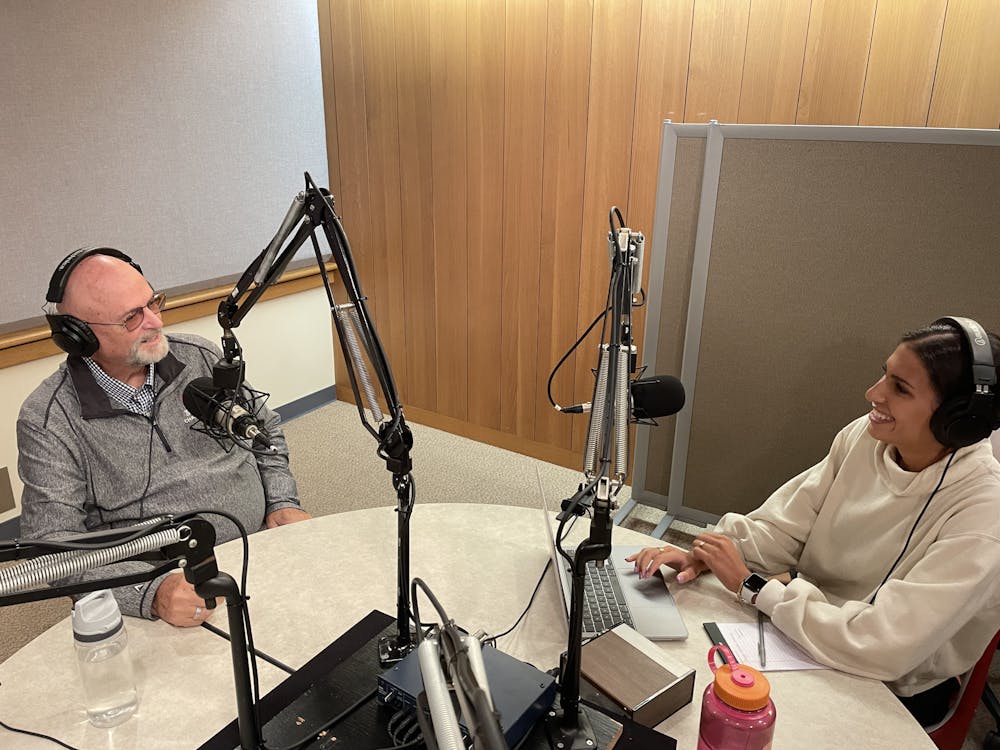The Miami Student’s podcast “People and Policies” focuses on Oxford’s local election cycle, featuring conversations with candidates about various issues relevant to students, faculty and residents.
On this episode, Staff Writer Olivia Patel sits down with Oxford City Council candidate and current mayor William Snavely. The two discuss affordable housing, assisting the homeless, environmental initiatives and economics here in Oxford.
Editor’s note: This conversation has been edited for concision. Listen to the podcast for the full conversation.
Patel: Tell me about yourself. How did you find yourself on Oxford’s City Council in the past?
Snavely: I came to Miami University in Oxford in 1977. In the mid ’80s, I started getting requests to consider council. Part of it was I attended some council meetings and spoke up. So, in 1987 I decided to run for council. I started teaching in the communication and theater department for three years, then I switched over to management and spent the next 27 years in management at Miami University.
This time I became mayor two years ago. My first term was from ’87 to ’91 then I was reelected from ’91 to ’95 and from ’93 to ’95 the council elected me as mayor.
Why did you choose to run for council again?
I took 10 years off from Miami and went to San Diego State to be the director of the school of communication there. After 10 years, I retired and we decided we needed to come home … back to Oxford. I served on the plan commission for a while then it looked like a good opportunity to come back onto city council, and that was four years ago.
What are some initiatives that you have pursued in the past and what are some initiatives you would like to pursue should you be reelected to city council?
If you go way back, our big initiative was parks, and it was parks for everybody. One of the things we did was the Uptown parks. Our council was behind that. We also created the community park. We also did a rollerblade park, when we took over some tennis courts that were not being used. That was the initial big project.
Lately, our main three goals are housing for everybody, climate action and supporting business in Oxford. That last one is a tough one. Because we are a college town, it is a difficult place for anyone to run a small business in Oxford. Oxford needs more 12 month employment because a lot of those small businesses depend on students. If you are a small business person, you have to figure out how to make it through the three month period [when students are not here].
Enjoy what you're reading?
Signup for our newsletter
We have tried doing a lot of festivals, sports events, swimming events and a big soccer tournament during the summer to bring people in from out of town.
How do you (as council) support small businesses?
We have a CIC (community improvement corporation) and we provide loans to small businesses that are starting off. One of the things that I am really proud of is that we have a collaboration with Miami University. This is an opportunity for aspiring business people to get into a space and actually talk to people who can help develop their business.
How do you see the City of Oxford developing in the next five years? 10 years?
The comprehensive plan defines that, and was developed with citizen input all the way. It covers all aspects of development in the City of Oxford. It's not just a book that we put away on a shelf and forgot about, it is something that is used on a daily basis. The other thing is that when staff come forward with proposals for the city, they will show how their plan fits in with the comprehensive plan.
City council has a huge focus on sustainability. How do you plan on supporting the environmental initiative?
Sure. There are a lot of things we can do. We have made a big effort to try and put solar [panels] on as many public buildings as we can. We have also been encouraging citizens to put solar panels on their homes. Solar is our main [sustainability] initiative right now.
We are also working on putting in an Amtrak station here in Oxford, which would provide transportation opportunities for students, especially if you are from Chicago. It is a complex project, but we are moving forward with these plans and working to secure a grant.
How do you plan on working towards affordable housing?
Affordable housing is our number one issue. You have to care about the people who need care the most. There are a lot of people who work at Miami University who would like to live here, but can’t afford it. We bought property off of Hester Road and are putting in a cottage community. This is for people who are not housed, or are just scraping by and can’t get anywhere else. This is a place to start. Then we also bought three parcels on Chestnut, which are for affordable housing.
Why are parks so important for the Oxford community?
It is a quality of life. I feel the same about public art. We have a lot of large walls that are vacant and ugly in Oxford, where we could do murals. One of the places I am thinking of is the alleyway between Mac and Joe’s and CJ’s. I think it would create a good feeling for people. I would also like to find ways to encourage sculptures within the City of Oxford. I hope that if I am re-elected, in the next four years, we will see more public art.
How do you plan on improving human welfare right here in Oxford?
I think part of it is our attention to the homeless, our attention to housing for everybody. I am a big supporter through Kiwanis of taking food that is no longer being used by Kroger and Walmart twice a week over to TOPSS (Talawanda Oxford Pantry). That food pantry gets quite a large volume of food every week from Kiwanis. We try to do it hands on and get involved.
We’ve discussed a lot of topics today … What in your opinion is the most important issue facing Oxford today?
That’s hard. I would say it is a flip between housing and climate action. Climate action is imperative for everyone on the planet. We are a small city, but we can do our part. Housing is so important here because we have so many students living off campus, and the landlords have set up a system where they charge huge rental rates that price everyone else out. There’s all this going to people who are students who come in for nine months then go out.
For people who live here year round, it’s hard, and that affects commerce as well. It’s hard for business, and it is certainly hard for people on fixed incomes. When I first came here, almost everyone who worked at Miami University lived in Oxford. It is a pretty small percentage now. It’s because we don’t have the affordability here that we need to have.




